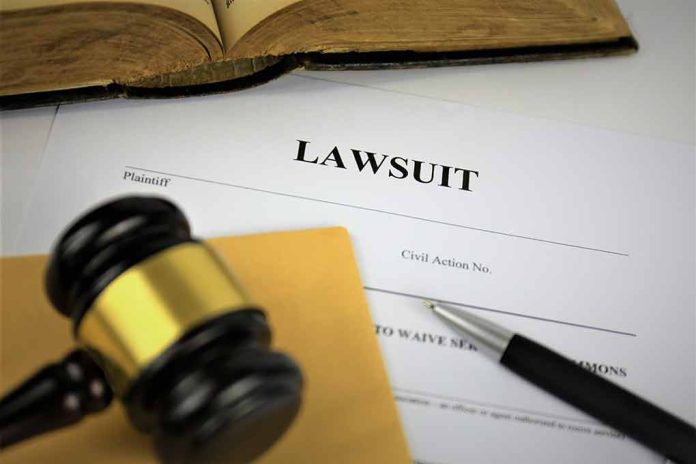
The ACLU is mounting a legal challenge against the Trump administration’s use of a centuries-old wartime law to deport Venezuelan nationals linked to terrorism.
Key Takeaways
- The ACLU filed a lawsuit to stop the use of the Alien Enemies Act for deporting Venezuelans tied to terrorism.
- The Supreme Court allowed the Trump administration to apply the act temporarily.
- The act, traditionally used for wartime enemies, is being repurposed for immigration enforcement.
- The ACLU seeks class action status to protect others from similar deportations.
Understanding the ACLU’s Lawsuit
The American Civil Liberties Union (ACLU) has taken legal action to prevent the Trump administration from using the Alien Enemies Act to deport individuals linked to terrorism. The emergency lawsuit has been filed in New York, aiming to stop this unprecedented application of the law by the Trump administration. The ACLU is challenging this move as it relates to two Venezuelan nationals, stating that the law should not be applicable in their cases as it historically pertains to wartime enemies.
President Trump’s administration cited associations with the Tren de Aragua, an organization considered a terrorist group with hostile actions against the U.S. The ACLU argues that the law is being misinterpreted, seeking to prevent the deportations through class action status to protect others in similar circumstances. This case could set a significant precedent for immigration law, particularly regarding the application of old laws to current events.
In March 2025, President Donald Trump, back in office, launched an aggressive deportation campaign targeting illegal immigrants. One key move was invoking the Alien Enemies Act of 1798 on March 14, 2025, to deport alleged Venezuelan gang members of Tren de Aragua without standard… pic.twitter.com/hi9REgdNNf
— Just Stuff™ (@just_stuff_tm) April 1, 2025
The Supreme Court’s Landmark Decision
The Supreme Court recently ruled in favor of the Trump administration, allowing for the provisional use of the Alien Enemies Act. This decision, however, requires that those affected must have the opportunity to challenge their deportation before their removal from the United States. The ruling came after a temporary restraining order was lifted, clearing the way for the administration to enforce the act. This development underscores ongoing legal complexities, particularly about the constitutionality of using wartime laws for immigration control.
The ACLU and its associated bodies have highlighted the importance of meaningful notice and opportunity for those detained. The organization continues to emphasize the need for fair hearings and is working to annul any deportations that proceed without due process. As the lawsuit unfolds, the constitutionality of the Alien Enemies Act in these contexts remains ambiguous, needing further judicial review.
The Supreme Court’s ruling in Trump v. J.G.G. (24A931) on April 7, 2025, doesn’t completely screw Trump—it’s more of a mixed bag.
Here’s why he’s not totally out of luck:
He won the immediate fight: The Court vacated the temporary restraining orders (TROs) that were stopping the… pic.twitter.com/fGZdw8sqRA— Unify America (@CMagill8830) April 8, 2025
Implications for Venezuelan Migrants
The ruling affects numerous Venezuelan migrants targeted for removal under the Alien Enemies Act, alleging ties to terrorism and gang membership. The Trump administration’s stance is that these individuals pose a threat given their alleged connections to violent criminal organizations. However, the identification of these individuals presents challenges, as many lack clear documentation linking them to the alleged crimes.
This case serves as a test for the extent to which historical laws can be utilized in modern judicial contexts. It brings to light issues surrounding due process and fair treatment of non-citizens in the U.S. The ACLU continues to fight for these individuals’ rights, ensuring they receive fair hearings before any deportation.
TONITES HISTORY LESSON / BED TIME STORY
Heather Cox Richardson
March 16, 2025 (Sunday)
Yesterday, President Donald Trump reached back to 1798 for authority to expel five people he claims are members of a Venezuelan gang. Trump invoked the 1798 Alien Enemies Act as the legal…— R. Wolfe (@Rick28232068) March 17, 2025
Conclusion
The ongoing legal battle between the ACLU and the Trump administration over the Alien Enemies Act highlights the complexities of applying historical legislation to contemporary immigration issues. As the case progresses, it underscores the importance of due process and fair hearings for immigrants accused of terrorism-related activities. The outcome could have significant implications for the future of immigration policy in the United States.
The use of the Alien Enemies Act remains a contentious topic, drawing attention from legal scholars and policymakers alike. As these legal proceedings continue, the emphasis on ensuring fair judicial review remains paramount, with the ACLU advocating for immigrant rights and justice.
Sources:
- Groups Move to Block Removals Under Alien Enemies Act | American Civil Liberties Union
- Trump touts Supreme Court deportation ruling under Alien Enemies Act as victory, but legal fight continues | PBS News
- ACLU files suit to block Alien Enemies Act deportations
- ACLU sues to prevent Trump admin from deporting alien enemies in wake of SCOTUS decision | Blaze Media







